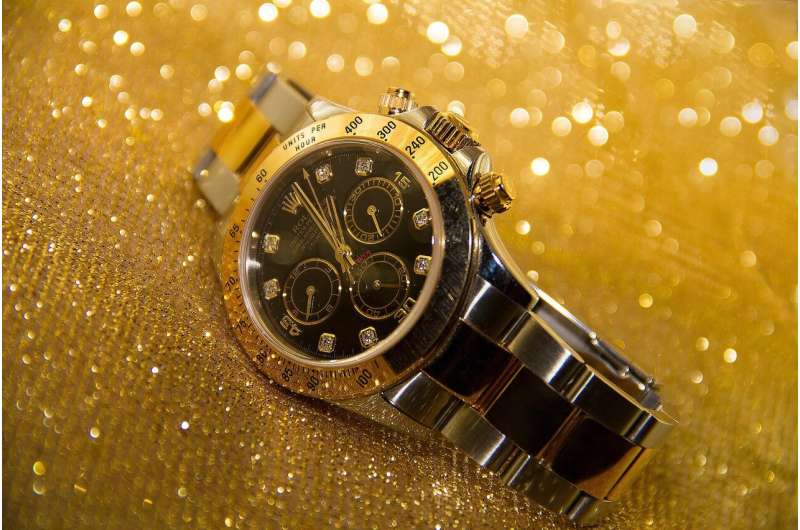This article has been reviewed according to Science X's editorial process and policies. Editors have highlighted the following attributes while ensuring the content's credibility:
fact-checked
trusted source
proofread
Hedonism drives luxury brand loyalty, not quality, according to study

What drives a person's preference towards traditional luxury brands? Flinders University researchers have found it's all about inflating the image of the purchaser, who desires such expensive luxury brands such as Rolex and Chanel to enhance their own identity.
"The findings indicate that only hedonism drives brand prestige and symbolism," says Dr. Nasser Pourazad, marketing researcher and lecturer in the College of Business, Government and Law at Flinders University.
"It shows that the development of love for luxury brands is primarily driven by symbolism rather than prestige brand attributes."
The study, "What (really) drives consumer love for traditional luxury brands? The joint effects of brand qualities on brand love," has been published by the Journal of Strategic Marketing.
The new findings—which contrast to previous studies—suggest that while a traditional luxury brand's social status and upscale position in the market are important to trigger love for a brand, consumers are more attuned to how they see the brand as a vehicle for their self-expression and social approval.
"Therefore, the prestige of traditional high-end luxury brands is less powerful in driving strong pro-brand connections, because consumers view these brands to be serving a higher purpose, such as symbolizing and reinforcing their personalities, values and self-identity," says Dr. Pourazad.
Luxury brands' power to symbolize meaningful values acts as the strongest trigger of brand love—a finding that expands an understanding of the symbolism attached to brands including social approval, self-personality, personal status and image driving.
"Brand uniqueness is a key driver of brand love for traditional luxury brands—which positively impacts the prestige of traditional luxury brands and enhances individuals' identity," says Pourazad.
"Brand prestige and symbolism then jointly shape brand love for traditional luxury, ultimately impacting all response variables."
The researchers tested the relationships between brand uniqueness, hedonism, brand prestige and symbolism; brand love; and purchase intention, positive word-of-mouth, and attitudinal brand loyalty.
The emotional experiences and hedonic benefits associated with owning a luxury brand shape the consumer's perception of the brand's symbolic values, luxuriousness, and exclusivity. Hedonism positively impacts the perceived prestige and symbolism of the brand.
Noting that 53% of the respondents to the study are Australian students, who can only aspire to buy these products, Pourazad says the findings illustrate what fuel the desires of consumers.
The study found that brand love is a strong predictor of repurchase intentions, positive word-of-mouth, brand advocacy, and brand forgiveness for traditional luxury brands. It is also more strongly related to behavioral loyalty than brand attitude.
The article highlights the importance of brand symbolism in driving consumer love for traditional luxury brands. Symbolic brands address consumers' needs to enhance their self-image and social image, and are chosen for their desirable meaning in social and cultural contexts.
More information: Naser Pourazad et al, What (really) drives consumer love for traditional luxury brands? The joint effects of brand qualities on brand love, Journal of Strategic Marketing (2023). DOI: 10.1080/0965254X.2023.2236615
Provided by Flinders University















